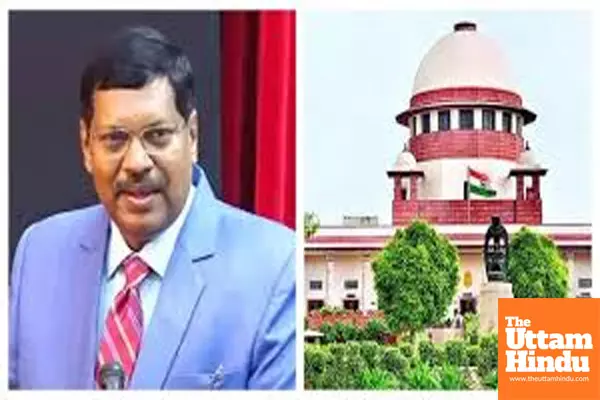
New Delhi (The Uttam Hindu) : President Draupadi Murmu has questioned the Supreme Court's decision to set a time limit for approval of bills. She has also sent a reference to the Supreme Court and sought its opinion. The President has sought the opinion of the Supreme Court on 14 questions. It is worth noting that on April 8, the Supreme Court had given a historic verdict in the case of the Tamil Nadu Governor keeping the bills pending for a long time. A time limit was set for the Governor and the President to approve the state bills. This historic verdict was given by a bench of Justice JB Pardiwala and R Mahadevan.
'Can SC fix a term limit for the President?'
After this decision of the Supreme Court, a debate started whether the Supreme Court can set a time limit for the President. When there is no time limit for the President in the Constitution, can the Supreme Court set a time limit through judicial order? Now the President himself has sought the answer to these questions by sending a reference (President's form) to the Supreme Court under the powers conferred under Article 143 (1) of the Constitution and seeking opinion. According to the established constitutional system, a bench of five judges of the Supreme Court hears the reference sent by the President and gives its opinion to the President.Almost all the questions in the reference sent by the President to the Supreme Court relate to Articles 200 and 201 of the Constitution, which deal with the approval of the Governor and the President on the bills passed by the state legislature.
What constitutional options does the Governor have when a Bill is presented before him for approval under Article 200?
Whether the Governor is bound by the aid and advice given by the Council of Ministers while exercising all the remedies available under the Constitution in presenting Bills for assent.
Whether the Governor is justified in exercising his constitutional discretion under Article 200.
Whether Article 361 of the Constitution imposes a blanket bar on judicial review in respect of actions taken by Governors under Article 200?
When no time limit and manner has been prescribed in the Constitution for the exercise of powers under Article 200 by the Governor, can any time limit and manner be prescribed for a judicial order?
Whether the President is justified in exercising his constitutional discretion under Article 201.
When the Constitution does not prescribe the procedure and time limit for the President to act under Article 201, can the manner and time limit for exercise of powers be prescribed by a judicial order?
When the Governor has reserved the Bill for the assent of the President or otherwise, whether the President should seek advice of the Supreme Court through Article 143 of the Constitution in the light of the scheme governing the powers of the President.
Whether the decisions of the Governor and the President under Articles 200 and 201 of the Constitution are justiciable at the pre-enactment stage of the law?
Whether courts are allowed to take judicial decision on the subject matter of a bill before it becomes law. Whether orders of the President and Governor in exercise of constitutional powers can be substituted in any way under Article 142 of the Constitution.
Whether a law made by the State Legislature is enforceable without the consent of the Governor under Article 200 of the Constitution.
Whether in view of the provisions of Article 145 (3) of the Constitution of India, it is not necessary for any Bench of the Supreme Court to first decide whether the issue before it involves a substantial question of interpretation of the Constitution and should be referred for consideration to a Bench of at least five Judges? Whether the powers conferred on the Supreme Court under Article 142 of the Constitution are limited to matters of procedural law or the powers under Article 142 extend to passing orders inconsistent with or contrary to the existing provisions of the Constitution or any applicable law. Can the Supreme Court resolve disputes between the Central Government and the State Governments in any jurisdiction other than a suit filed under Article 131? That is, does the Supreme Court have the right to hear disputes between the Centre and the State only in a suit filed under Article 131?
A bench of five judges will hear the case
As per the established system, the reference sent by the President to the Supreme Court and the opinion sought on it will be heard by a bench of five judges of the Supreme Court and will give its opinion.
